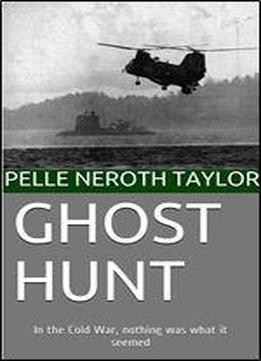
Ghost Hunt: In The Cold War, Nothing Was What It Seemed
by Pelle Neroth Taylor /
2015 / English / EPUB
259.1 KB Download
The Cold War was not only a military confrontation, frozen along the line of the Berlin Wall. It was also a psychological confrontation, a battle for the good opinions of the people of Europe. In the early 1980s, the Americans were losing the battle. The new Reagan administration was feared and loathed by Europe's publics for ending detente with the Soviet Union and pushing very publicly for aggressive confrontation in order to defeat it. It was a prequel to the United States's showdown with Putin's Russia today.
The public's fears that nuclear war would erupt in this superpower confrontation - one superpower pushing, one cornered - were widespread, and big cities in Western Europe experienced huge peace marches. Hundreds of thousands marched in London and other cities calling for a ban on the bomb. However, several governments, notably Norway, Sweden and West Germany, were openly sceptical towards the aggressive American stance. Britain's Margaret Thatcher supported the United States.
How did the United States (and Britain) react and regain the initiative?
There were ghosts in Swedish waters in the 1980s. Ghost submarines. Guarding the forested islets and bays of the Swedish archipelago, overlooking the flat, grey Baltic sea, often shrouded in damp mist, many thousands of Swedish conscripts, now in late middle age, remember being on the lookout at the shoreline, gazing out, morning, day and night. There were observations of unidentified submarines gliding on the surface, conning towers, strange periscopes and frogmen who, on shore, left behind tin cans with Cyrillic lettering.
The newspapers covered the ongoing incidents, which lasted for weeks at a time over several years, creating a sense of collective anxiety among the Swedish public. Relying on archive material never before been made public, the mystery is here revealed. Using submarines as tools of intimidation, it was an act of psychological warfare, political destabilization, by a foreign power.
But which foreign power? And what were the consequences?
This is an untold story about the Cold War in Scandinavia, about the inside political workings of the US and Britain and their top secret navy strategies It tells us about a Swedish leftist prime minister - a peace dove, a humanitarian hero - being broken by the challenge to his authority. It follows the author's quest for the truth, and tells of the problems experienced by those Scandinavian historians who made the mistake of going where the story took them.
This is an important and exciting work of contemporary political history, covering the missing jigsaw piece of Scandinavia, without which our knowledge of the Cold War would not be complete.











